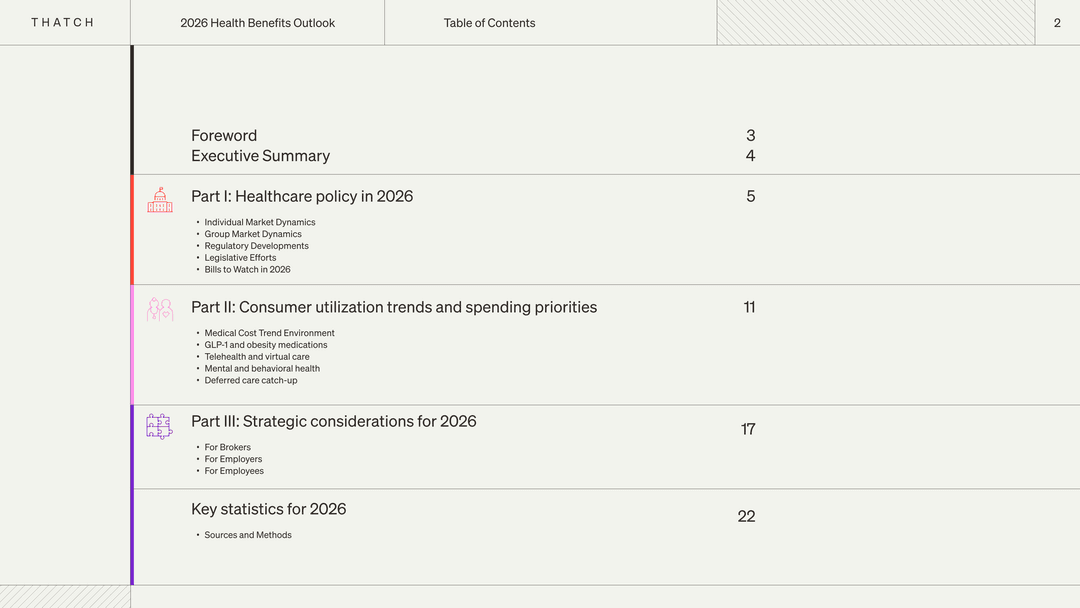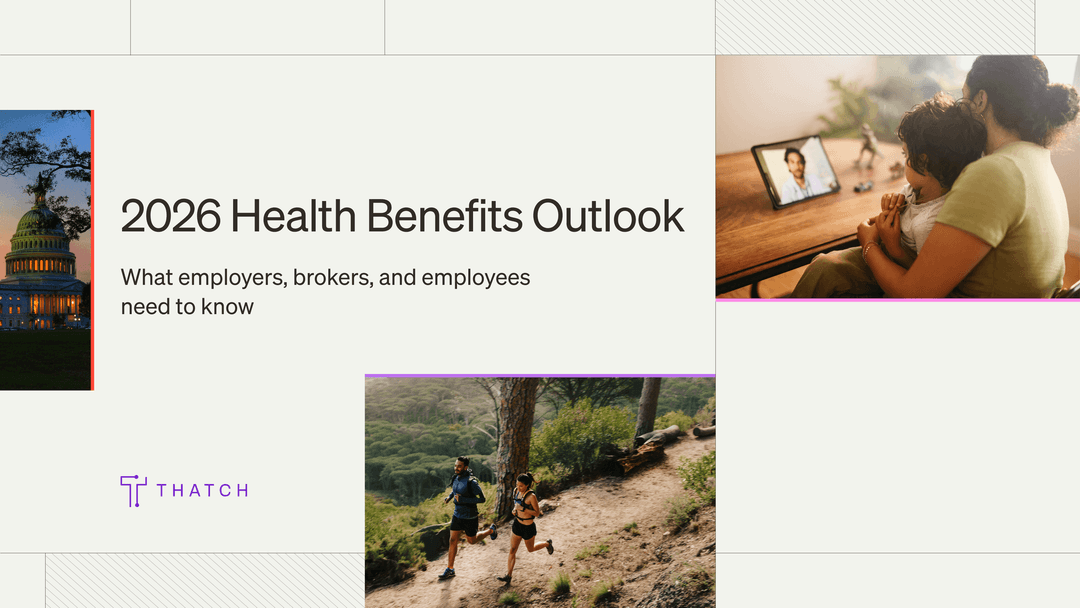With ICHRA, employers can pay the premiums for employees with Medicare and cover some out-of-pocket costs. Learn more and understand the requirements.
If your business employs people who qualify for Medicare, you may have questions about what health benefit options you can offer. If you’re considering setting up an Individual Coverage Health Reimbursement Account (ICHRA), there’s good news: As long as the requirements are met, people who qualify for Medicare can use ICHRA funds toward their Medicare premiums as well as eligible out-of-pocket healthcare expenses.
The key requirement for employees to use ICHRA funds for their Medicare premiums is that they are enrolled in Medicare Parts A and B together or Medicare Part C, also known as Medicare Advantage. Most employees who have Medicare already meet this threshold, but there are some exceptions and additional rules for employers to keep in mind.
Here, we’ll cover what you need to know about Medicare and ICHRA, and how these health benefits can work together as a winning combination for employees.
What do you need to know about Medicare?
The U.S. healthcare system is very complex, including Medicare. It’s helpful to have a basic understanding of how Medicare works in order to understand how Medicare and ICHRA can be integrated together.
There are a few ways people can qualify for Medicare:
They turn 65 years old.
They have a disability.
They have End-Stage Renal Disease (ESRD) or Amyotrophic Lateral Sclerosis (ALS).
People who qualify for Medicare have coverage options, broken down into Parts A, B, C, D, and Medigap. People signing up for Medicare can choose “Original Medicare,” which is a combination of Medicare Parts A and B, or they can choose a Part C–or Medicare Advantage–plan. If they choose Original Medicare, they may also consider “Medigap” coverage. Here’s a breakdown of the key terms:
Medicare Part A: This is often referred to as “hospital coverage”, and it typically has no premium. It covers hospital care, hospice care, skilled nursing facility care, and home care.
Medicare Part B: This coverage has premiums and covers many forms of medical care, including services from healthcare providers, outpatient care, preventive care — such as checkups and screenings — and some types of medical equipment.
Medicare Part C: This is also known as Medicare Advantage and carries premiums. Private insurers can offer Medicare-approved plans that bundle Medicare Parts A and B together as a package, with Part D typically included as well. Medicare Advantage plans may require beneficiaries to see healthcare providers in a specific network. Out-of-pocket costs and any extra benefits vary between plans.
Medicare Part D: This coverage is for prescription drug benefits. For people who choose Medicare Advantage, it’s often bundled as part of a plan. Premiums vary based on the plan.
Medigap: This coverage helps people who choose Original Medicare cover their out-of-pocket costs. Premiums vary based on the plan.
After a Medicare beneficiary has made their coverage choices, they still have the option to make changes during the yearly open enrollment period. Certain life events may also trigger special enrollment periods that allow people to make changes. For example, losing an existing group health plan and being offered new health coverage options, such as ICHRA, triggers a special enrollment period.
What do you need to know about ICHRA?
ICHRA is a type of health benefits plan that allows businesses to provide a set allowance of tax-free funds for their employees to use toward the health plan that best fits their needs. ICHRAs can be structured in a variety of ways to maximize health coverage options and tax benefits for employees and employers.
ICHRAs may be premium-only, meaning ICHRA funds can only be used toward health plan premiums, or ICHRAs can be set up to allow employees to use the funds toward out-of-pocket medical expenses, too. Thatch can help your business determine the best approach when adopting ICHRA.
The beauty of ICHRA is that it enables employers to have more control over health benefit costs while allowing employees to choose the best health plan for their individual needs and budget. If you have employees who qualify for Medicare, ICHRA can be set up in a way that allows eligible employees to use their ICHRA funds for their Medicare premiums as well as certain out-of-pocket expenses. This is a wonderful perk for these employees, and it can be a potential cost saver for businesses, too.
How does ICHRA integrate with Medicare Parts A, B, and C? According to the rules that govern ICHRA and Medicare, employees who have Medicare can have their premiums reimbursed as long as they have Medicare Parts A and B together, often called Original Medicare, or Medicare Part C, also known as Medicare Advantage.
Here’s why: ICHRA funds can only be used for health plans that qualify as “minimum essential coverage” (MEC). Medicare Part B on its own wouldn’t meet the MEC standard. In addition, Medicare Part A is typically free, with no premiums, so there’s generally no reason a person who qualifies wouldn’t choose to have it.
Keep in mind, while it’s uncommon for people to sign up for only Part A, it can happen. For example, someone might only sign up for Part A if they already have coverage through a spouse’s health plan, but they want an additional layer of hospital coverage. If your business decides to pivot from a traditional group health plan to ICHRA, this would typically trigger a special enrollment period to allow Medicare beneficiaries who only have Part A to sign up for Part B, too.
Medicare Part C is also popular. Even though Part C combines Parts A and B — and often, Part D, too — there are a variety of $0 premium Medicare Advantage plans available.
The enrollment numbers can give you a sense of just how common it is for people to enroll in either Parts A and B together, or Part C. Of the 69 million people enrolled in Medicare as of June 2025:
More than 35.3 million are enrolled in Medicare Part C, such as a Medicare Advantage plan
Nearly 34 million are enrolled in Original Medicare
This is great news for businesses that are considering adopting ICHRA. It’s likely that most of your employees with Medicare will already qualify to start using ICHRA funds for their Medicare premiums.
What are the ICHRA eligibility requirements for Medicare beneficiaries?
For employees to use an ICHRA and receive reimbursements, they must have a qualifying health plan. Fortunately, Medicare can meet this requirement. As long as employees with Medicare are enrolled in Parts A and B together or Part C, they are eligible for ICHRA. This means that employees can use their ICHRA funds to pay for any Medicare premiums, including Parts A, B, C, D, and Medigap. (Note, it’s rare for Medicare Part A to have premiums).
Beyond this requirement, there are some specific rules that businesses need to follow when setting up ICHRA, if they have employees with Medicare. Here are a few points to keep in mind:
Certain rules prohibit businesses from offering ICHRA only to employees with Medicare. ICHRA does allow businesses to structure ICHRA differently for different classes of employees, such as part-time and full-time employees, but Medicare beneficiaries can’t be treated as a separate class.
ICHRA can be set up to allow employees to use ICHRA funds for out-of-pocket medical expenses, and businesses have some control over which expenses are eligible. However, the list of eligible expenses can’t be set up based on what Medicare does or doesn’t cover.
ICHRA has compliance and reporting requirements. For example, employees, including those with Medicare, must substantiate that they have health coverage for the time they are covered by ICHRA. They must also substantiate coverage for every month they get reimbursed for a medical expense.
Though ICHRA rules and the reporting requirements may seem onerous, Thatch makes it easy. Thatch can help your business set up ICHRA to meet the needs of all your employees, while also making compliance and reporting a seamless process. What are the benefits of ICHRA if you have Medicare?
Offering ICHRA is a significant bonus for Medicare employees. Depending on how ICHRA is structured, employees can cover their Medicare premiums with tax-free funds and may also get reimbursed for eligible medical expenses. This may even allow employees to choose a more comprehensive drug plan or Medicare Advantage plan to get maximum health coverage and value.
Essentially, employees with Medicare still get to choose the Medicare plan that works best for them, but they get the benefit of having their premiums reimbursed.
What are the next steps for employers?
ICHRA offers meaningful advantages to employers and their teams, including Medicare-eligible employees. For businesses, ICHRA provides a way to rein in rising health benefits costs, while still providing employees with strong health coverage options. Employees gain the freedom and flexibility to use their ICHRA funds toward a health plan that fits their health needs and budget. For employees with Medicare, they can typically have their Medicare premiums covered, and may be able to cover additional out-of-pocket expenses, too.
If you’re ready to adopt ICHRA for your business, Thatch is here to help. Take the next step and book a demo today. This article is for general educational purposes and is not legal or tax advice. The opinions shared here belong to the author and are not official statements from Thatch. For legal and tax questions, please consult with a qualified professional.



